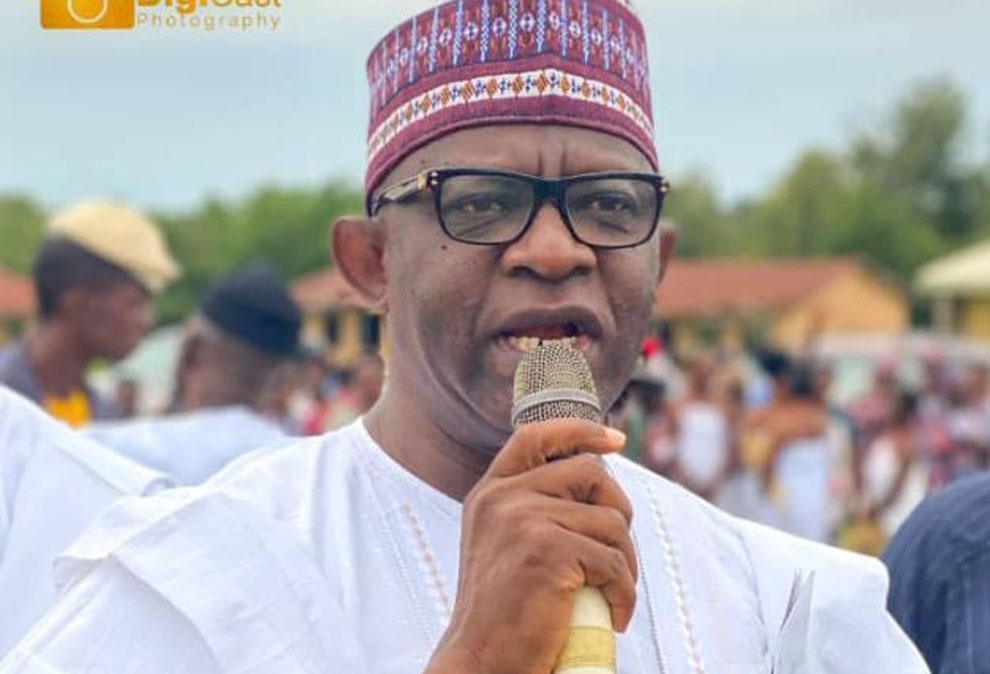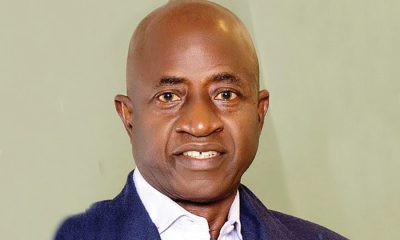News
REVEALED: How Binance executive escaped from custody amid tax evasion charges

REVEALED: How Binance executive escaped from custody amid tax evasion charges
Nadeem Anjarwalla, one of the two Binance executives arrested in Nigeria for alleged tax evasion and other offenses, has escaped from lawful custody, Premium Times reports.
According to Premium Times, Mr Anjarwalla, 38, escaped on Friday, 22 March, from the Abuja guest house where he and his colleague were detained after guards on duty led him to a nearby mosque for prayers in the spirit of the ongoing Ramadan fast.
The Briton, who also has Kenyan citizenship, is believed to have flown out of Abuja using a Middle East airliner.
It remains unclear how Mr Anjarwalla got on an international flight despite his British passport, with which he entered Nigeria, remaining in the custody of the Nigerian authorities.
Authorities are also said to be working to unravel his intended destination in a bid to get him back into custody.
An Immigration official said the Binance executive fled Nigeria on a Kenyan passport. He, however, said authorities were trying to determine how he obtained the passport, given that he had no other travel document (apart from the British passport) on him when he was taken into custody.
Another source said the two officials were held at a “comfortable guest house” and allowed many rights, including the use of telephones, a privilege Mr Anjarwalla is believed to have exploited to plot an escape.
When contacted Sunday night on the escape of the Binance executive from detention, the Head of Strategic Communication at the Office of the National Security Adviser, Zakari Mijinyawa, said he would enquire and revert. He has yet to do so as of the time of filing this report.
READ ALSO:
- Simon Ekpa declares Tinubu, eight others wanted
- Bandits kill two, kidnap two in Katsina
- Why students died during palliative distribution stampede – Gov, Sule
Mr Anjarwalla, Binance’s Africa regional manager, and Tigran Gambaryan, a US citizen overseeing financial crime compliance at the crypto exchange platform, were detained upon their arrival in Nigeria on 26 February 2024.
A criminal charge was filed against the two executives before a Magistrate Court in Abuja. On 28 February 2024, the court granted the Economic and Financial Crimes Commission (EFCC) an order to remand the duo for 14 days. The court also ordered Binance to provide the Nigerian government with the data/information of Nigerians trading on its platform.
Following Binance’s refusal to comply with the order, the court extended the remand of the officials for an additional 14 days to prevent them from tampering with evidence. The court then adjourned the case till 4 April 2024.
Also on 22 March, the Nigerian government approached the Federal High Court in Abuja and slammed another four-count charge on Binance Holdings Limited, Mr Anjarwalla and Mr Gambaryan, accusing them of offering services to subscribers on their platform while failing to register with the Federal Inland Revenue Service to pay all relevant taxes administered by the Service and in so doing, committed an offence, contrary to and punishable under Section 8 of the Value Added Tax Act of 1993 (as Amended).
The defendants were also accused of offering taxable services to subscribers on their trading platform while failing to issue invoices to those subscribers to determine and pay their value-added taxes and, in so doing, committed an offence contrary to and punishable under S.29 of the Value Added Tax Act of 1993 (as amended).
Count Three of the charges accused the three defendants of offering services to subscribers on their Binance trading platform for the buying and selling of cryptocurrencies and the remittance and transfer of those assets while failing to deduct the necessary Value Added Taxes arising from their operations and thereby committing an offence contrary to and punishable under Section 40 of the Federal Inland Revenue Service Establishment Act 2007 (as amended).
The last count of the charges wants the defendants punished for allegedly aiding and abetting subscribers on their Binance trading platform to unlawfully refuse to pay taxes or neglect to pay those taxes and, in so doing, committing an offence contrary to and punishable under the provisions of S.94 of the Companies Income Tax Act (as amended).
The Nigerian government had, in the past three months, been cracking down on suspected money launderers and terrorism financiers, some of whom it alleged are using the Binance platform for criminal activities
The Nigerian government said over $21.6 billion was traded by Nigerians whose identities were concealed by Binance.
The government also claimed its investigations revealed that unscrupulous elements were using Binance for money laundering, terrorist financing, currency speculation and market manipulation, distorting the Nigerian economy and weakening the Naira against other currencies.
The detention of Binance officials in Nigeria began months after the crypto exchange platform pleaded guilty and agreed to pay $4.3 billion to settle criminal money laundering charges levied by the US Department of Justice.
Binance founder and CEO Changpeng Zhao, also known as CZ, pleaded guilty and agreed to resign. His criminal trial has been postponed to 30 April by a US court.
REVEALED: How Binance executive escaped from custody amid tax evasion charges
(PremiumTimes)
News
Why governors’ forum is silent on Rivers emergency, by DG

Why governors’ forum is silent on Rivers emergency, by DG
The Nigeria Governors’ Forum (NGF) yesterday attributed its neutral position on the recent declaration of a state of emergency in Rivers State to the need to steer clear of taking positions that may alienate members with varying political interests.
Taking positions on contentious partisan issues, the NGF said, would not augur well for it, especially in view of its past experience in fundamental division.
Notwithstanding, the declaration of the state of emergency by President Bola Tinubu yesterday generated more kudos and knocks from across the country.
Special Adviser to the President on Senate Matters, Senator Basheer Lado, said the action of the president was meant to ensure protection of lives and restoration of law and order in the state, while the President’s Special Adviser on Media and Public Communications, Sunday Dare, said his principal was required to “avert needless harm and destruction .”
National Publicity Secretary of the ruling All Progressives Congress (APC), Felix Morka, said Tinubu, by his action, cleared what had manifested as a constitutional crisis in Rivers state.
But former President Goodluck Jonathan saw it from a different perspective.
READ ALSO:
- Senate didn’t get 2\3 majority for Tinubu emergency rule in Rivers –Tambuwal
- FG destroys another 200 containers of expired drugs
- Rivers court bars woman from answering ex-husband’s name
He described “abuse of office and power by the three arms of government in the country“ as a dent on Nigeria’s image.
The NGF, in a statement by its Director General Abdulateef Shittu, said it is essentially “an umbrella body for sub-national governments to promote unified policy positions and collaborate with relevant stakeholders in pursuit of sustainable socio-economic growth and the well-being of the people.”
It added: “As a technical and policy hub comprising governors elected on different platforms, the body elects to steer clear of taking positions that may alienate members with varying political interests.
“In whatever language it is written, taking positions on contentious partisan issues would mean a poor sense of history — just a few years after the forum survived a fundamental division following political differences among its members.
“Regardless, the Forum is reputed for its bold positions on governance and general policy matters of profound consequences, such as wages, taxes, education and universal healthcare, among others.”
It asked for “the understanding of the public and the media, confident that appropriate platforms and crisis management mechanisms would take care of any such issues.”
Why governors’ forum is silent on Rivers emergency, by DG
News
Rivers: Tinubu acted to save state, economy, says Karimi

Rivers: Tinubu acted to save state, economy, says Karimi
Chairman of the Senate Services Sunday Karimi has hailed President Bola Tinubu for the decision to declare a state of emergency in Rivers State.
He told reporters on Friday in Abuja that the President acted in the best interest of the State and Nigeria, having taken his decision in compliance with the Constitution.
“No President or government worth a name, will fold its arms and watch a political situation deteriorate to what we saw unfolding in Rivers State.
“We saw that bombing of pipelines had begun, and the security situation was getting worse with the tension everywhere”, Karimi stated.
Karimi, who represents Kogi-West on the ticket of the All Progressives Congress (APC), recalled the “fatherly role” Tinubu had played in the crisis since 2023 in a bid to get the Minister of the Federal Capital Territory (FCT), Nyesom Wike, and suspended Governor Siminalayi Fubara to reach an understanding, to no avail.
He explained: “We were all here in 2023 when Mr President called that truce meeting at the Aso Rock Villa. There was the eight-point agenda for settlement reached between the factions.
“When Nigerians expected that progress should be made to achieve peace, things started deteriorating considerably to a point where the governor demolished the House of Assembly building and administered the state with only three legislators.”
READ ALSO:
- Oluwo accuses Ooni of plotting to dethrone him
- Natasha: Court blocks recall attempt, stops INEC
- US ends legal status for 500,000 immigrants
Karimi observed that with the recent judgment of the Supreme Court, which gave the upper hand to the 27 lawmakers loyal to the camp of the FCT Minister, matters merely got worse in the State as the lawmakers were set to impeach the Governor.
“What did you expect would be the implications? There would have been more destruction, killings and economic losses for the country.
“With the bombings that had already started, it was a matter of time before the whole state would be engulfed in flames. No responsible President would sit, arms folded, and allow that to happen “ he added.
The senator further argued that it took “painstaking efforts” by the administration to raise daily crude oil production to around 1,800 barrels, noting that Nigeria’s economy was already “witnessing a rebound under the renewed hope projects of the government.”
“Allowing the situation in Rivers to get worse before he would act, wouldn’t have helped the state or Nigeria as a country in any way.
“Mr. President intervened at the right time, and his actions are covered by law,” he said.
Karimi also spoke on the emergency declaration in Borno, Yobe, Adamawa and a couple of other states by former President Goodluck Jonathan without removing the Governors from office or suspending the state assemblies.
According to him, the case with those States was not generated by political crises but rather security concerns.
“So, I will advise those comparing the two scenarios to remember that one was purely about security threats resulting from the insurgency caused by Boko Haram, while that of Rivers is clearly political.
“It was the proper thing to do to suspend the political actors in the two factions to allow for tensions to diffuse. Nigerians should appreciate the President for the action he has taken so far,” he stated.
Sen. Karimi also noted that there was no cause for alarm as the National Assembly had indicated that the emergency rule could be reviewed as soon as there were signs that things could quickly normalise in Rivers State.
Rivers: Tinubu acted to save state, economy, says Karimi
News
Just in: Tinubu swears in Rivers Sole Administrator Ibas

Just in: Tinubu swears in Rivers Sole Administrator Ibok-ete Ibas
President Bola Tinubu has sworn in Vice Vice Admiral Ibok-ete Ibas (Retd.) as the Sole Administrator of Rivers State.
The administrator was sworn in on Wednesday after a short meeting with the President.
Tinubu announced the appointment of the retired naval chief at a nationwide broadcast on Tuesday, when he declared a state of emergency in Rivers State and suspended Governor Siminalayi Fubara, Deputy Governor, Ngozi Odu, and the state House of Assembly members.
The President said his decision was based on Section 305 of the 1999 Constitution, saying he could not continue to watch the political situation in Rivers escalate without taking concrete action.
The suspension of Fubara and other elected representatives has been rejected and condemned by many eminent Nigerians, legal luminaries, groups such as Atiku Abubakar, Peter Obi, Femi Falana, the Labour Party (LP), the Peoples Democratic Party (PDP) and the Nigerian Bar Association.
However, the emergency rule has been praised by the pro-Nyesom Wike Assembly led by Martins Amaewhule, accusing Fubara of contravening the Supreme Court ruling on the political situation in the state.
Ibas was the Chief of Naval Staff from 2015 to 2021.
He is from Cross River State where he had his early education.
The new sole administrator went to the Nigerian Defence Academy in 1979 from where he proceeded to have a successful career in the Navy, rising through the ranks to the very top.
He is a member of the Nigerian Institute of International Affairs (NIIA) and the Nigerian Institute of Management.
President Muhammadu Buhari who appointed him as Chief of Naval Staff conferred him with the National Honour of Commander of the Federal Republic (CFR) in 2022.
-

 metro2 days ago
metro2 days ago‘We’re not hiring,’ NNPC denies viral recruitment adverts
-

 metro2 days ago
metro2 days agoNatasha: Court blocks recall attempt, stops INEC
-

 Sports2 days ago
Sports2 days agoOdegbami speaks on Osimhen breaking his 44-year goals record
-

 metro3 days ago
metro3 days agoMore trouble brews in Rivers as Ijaw congress considers self-determination option
-

 Entertainment2 days ago
Entertainment2 days agoI didn’t snatch Asake’s mother from her husband -Musibau Alani
-

 Sports2 days ago
Sports2 days ago2026 WCQ: Super Eagles move up to third place with 2-0 win in Rwanda
-

 metro2 days ago
metro2 days agoBoko Haram attacks military base in Adamawa
-

 Sports2 days ago
Sports2 days agoOsimhen breaks Odegbami’s Eagles goal record









